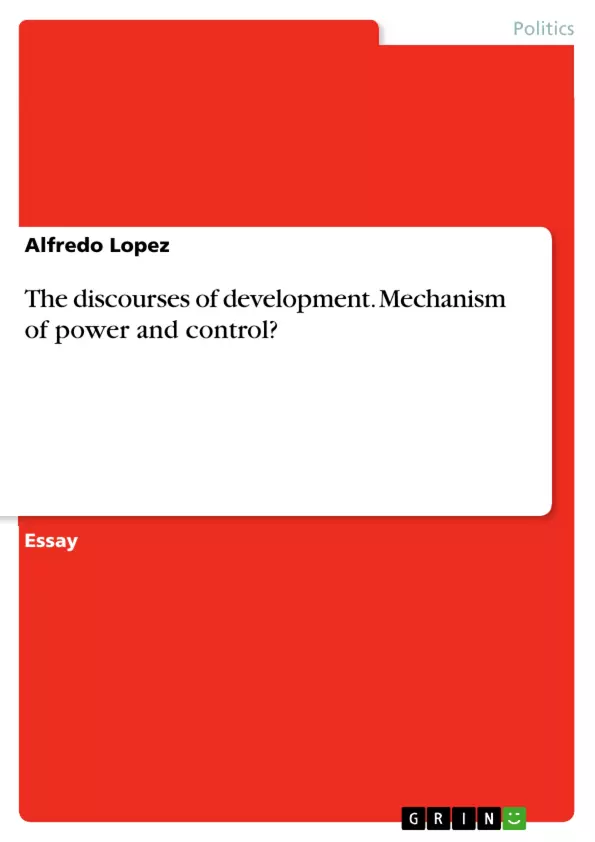The essay describes three important aspects of development: development theories that have not contributed to the international development, other concepts about development and benefits and drawbacks of modern development. Finally, a summary of this essay is presented.
Despite all the existing development discourses and although hundreds of institutions work for the development of the third world, it has not been possible to free vulnerable people from poverty, hunger, unemployment and social inequality. In fact, Escobar, suggests that discourses of development serve as a mechanism of intervention and domination of the third world. Thus, this essay responds to the next question: are the discourses of development a mechanism of power and control used by the first world to keep their domination over the third world?
Inhaltsverzeichnis (Table of Contents)
- Introduction
- Development theories that have not contributed to international development
- Other concepts about development
- Benefits and drawbacks of modern development
- Conclusion
Zielsetzung und Themenschwerpunkte (Objectives and Key Themes)
This essay examines the effectiveness of development discourses in achieving their stated goals, particularly in alleviating poverty and inequality in the developing world. It questions whether these discourses function as tools of power and control exerted by developed nations. The essay analyzes various aspects of development, including theories that have proven ineffective, alternative development approaches, and the benefits and drawbacks of modern development practices.
- Critique of traditional development theories
- Exploration of alternative development approaches
- Analysis of the power dynamics inherent in development discourses
- Assessment of the impact of economic growth on poverty reduction
- Examination of the role of education and community participation in development
Zusammenfassung der Kapitel (Chapter Summaries)
Introduction: This introductory section sets the stage for the essay by highlighting the prevalence of development discourses despite their apparent failure to eradicate poverty and inequality. It introduces the central question: Do development discourses serve as mechanisms of power and control, perpetuating dominance of the developed world over the developing world? The introduction outlines the essay's structure, promising to examine development theories, alternative concepts, and the benefits and drawbacks of modern development.
Development theories that have not contributed to international development: This chapter critically analyzes various development theories, focusing on their shortcomings in achieving genuine development. It challenges the notion that economic growth alone equates to development, citing examples of economically developed countries with widespread poverty. The chapter also examines Marxist and socialist ideologies, arguing that their implementation in some countries has led to economic and social deterioration, contradicting their intended aims. The chapter uses the example of Venezuela to illustrate the failure of socialist policies to alleviate poverty despite vast natural resources. The contrasting experiences of economic growth and human development are central themes.
Other concepts about development: This chapter explores alternative development approaches that prioritize community participation and empowerment. It highlights the concept of "alternative development," emphasizing the importance of including local communities in development projects to ensure their success and sustainability. The chapter discusses the contributions of prominent thinkers like Paulo Freire, Manfred Max-Neef, and Fritz Schumacher, who advocate for education, grassroots participation, and a redefinition of human needs as crucial elements of development. The importance of indigenous knowledge in sustainable development practices is also explored.
Schlüsselwörter (Keywords)
International development, development theories, alternative development, post-development, economic growth, poverty, inequality, power, control, community participation, education, Marxism, socialism, indigenous knowledge, empowerment.
Frequently Asked Questions: A Comprehensive Language Preview
What is the main topic of this essay?
The essay examines the effectiveness of development discourses in achieving their stated goals, primarily poverty and inequality reduction in developing countries. It questions whether these discourses serve as tools of power and control imposed by developed nations.
What are the key themes explored in the essay?
Key themes include a critique of traditional development theories, exploration of alternative development approaches, analysis of power dynamics in development discourses, assessment of economic growth's impact on poverty, and the role of education and community participation in development.
Which development theories are criticized in the essay?
The essay critically analyzes various development theories, highlighting their shortcomings in achieving genuine development. It challenges the notion that economic growth alone equals development and examines the failures of Marxist and socialist ideologies in certain contexts, using Venezuela as a case study.
What alternative development approaches are discussed?
The essay explores alternative approaches prioritizing community participation and empowerment. It discusses "alternative development," emphasizing the inclusion of local communities. The contributions of thinkers like Paulo Freire, Manfred Max-Neef, and Fritz Schumacher, who advocate for education, grassroots participation, and a redefinition of human needs, are highlighted. The importance of indigenous knowledge is also explored.
What are the main chapters of the essay?
The essay includes an introduction, a chapter on ineffective development theories, a chapter on alternative development concepts, a chapter on the benefits and drawbacks of modern development, and a conclusion. Each chapter summarizes key arguments and findings.
What is the central question the essay seeks to answer?
The central question is whether development discourses serve as mechanisms of power and control, perpetuating the dominance of the developed world over the developing world.
What are the key words associated with this essay?
Keywords include international development, development theories, alternative development, post-development, economic growth, poverty, inequality, power, control, community participation, education, Marxism, socialism, indigenous knowledge, and empowerment.
What is the purpose of the "Chapter Summaries" section?
The "Chapter Summaries" section provides concise overviews of the main arguments and findings presented in each chapter of the essay, offering a structured understanding of the overall content.
What is the overall conclusion of the essay (implied)?
While not explicitly stated in the provided preview, the implied conclusion suggests a critical perspective on traditional development models and a call for more participatory and equitable approaches that prioritize community needs and indigenous knowledge.
- Arbeit zitieren
- Alfredo Lopez (Autor:in), 2018, The discourses of development. Mechanism of power and control?, München, GRIN Verlag, https://www.grin.com/document/470313



